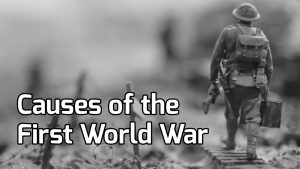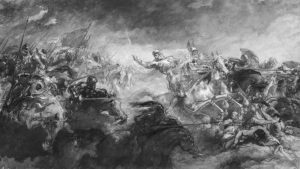Causes of The First World War: The First World War (1914-1918) was a watershed in the history of the world. The war was fought across the borders of many countries. Not only did the war involve many countries, it also led to the loss of lives of both civilians and soldiers, and cost the countries involved a lot of resources.
There are several reasons why the First World War was fought. These represent the factors and circumstances which caused the commencement and execution of the war.

Recommended: Causes of the Aba women riot of 1993
Major Causes of World War 1
1. Assassination of Archduke Franz Ferdinand: There are several causes of the First World War. However, the assassination of Archduke Franz Ferdinand, the heir to the throne of Austro-Hungarian Empire was the immediate cause of the war. Archduke Franz Ferdinand was killed by Gavrilo Princip, a Serbian nationalist on 28 June 1914 while he was in Bosnia. The assassination brought about different reactions from countries which ultimately resulted in the war.

The first country to respond to the assassination incident was Austria-Hungary. Austria-Hungary indicted Serbia for the assassination and made certain demands which it required Serbia to comply with. But Serbia refused to comply with the demands. This led to the declaration of war on Serbia by Austria-Hungary on the 28 July 1914, a month after the assassination.
The declaration of war attracted the attention of other countries, particularly the allies of both Austria-Hungary and Serbia. Russia, an ally of Serbia was the first to respond to the declaration of war. It mobilised its forces and made preparation to defend Serbia against Austria-Hungary. This in turn drew a response from Germany, an ally of Austria-Hungary.
Germany declared war on Russia and France, two allies of Serbia. Subsequently, Britain declared war on Germany. Britain’s declaration of war on Germany was a reaction to the invasion of Belgium by Germany on 3 August 1914. Other countries also accumulated large amount of arms and ammunition.
In time, many countries became directly or indirectly involved in the war and it did not take long for the war to turn into a global warfare.
Also see: Significant features of the US constitution
2. Militarism and Military Rivalry: The beginning of the 20th century saw many countries competing with one another in the acquisition of arms. Countries increased the number and quality of their arms and ammunition. Warships, guns and other weapons were bought in large numbers. It is estimated that Germany had up to 100 warships in 1914.

In addition to the increase in the acquisition of arms and ammunition, the number of the members of the armed forces of these countries also increased. Many of these countries more than doubled the number of the members of the Navy and Army. They competed with one another on the expansion of the size of their army and navy forces. The rivalry was particularly fierce between Germany and France which doubled their army and navy forces between 1870 and 1914.
The maintenance of powerful and large military forces led to heightened tension and suspicion among the different countries. This eventually led to aggressiveness and threat of the use of force. The suspicion caused by the expansion of military forces, aggressiveness and the use of force eventually led to the war.
Recommended: Highest paying Jobs in South Africa
3. Nationalism: The wave of nationalism and patriotic sentiments swept across Europe in the 20th century and this greatly contributed to the war. The war began primarily as a result of these nationalist and patriotic sentiments and also led to its expansion across the borders of various countries.
The upswing of nationalist sentiments among the Slavic populations in Bosnia and Herzegovina contributed directly to the war. The Slavic populations sought to cease being part of Austria-Hungary and to become part of Serbia. The nationalist sentiments among the Slavic populations climaxed in the assassination of Archduke Franz Ferdinand, an incident which was the immediate cause of the war.

Also, the Slavic nationalist sentiment which had taken root in Russia influenced Russia’s decision to side with Serbia, a decision which influenced other countries to take sides. Eventually, this resulted in the commencement, prosecution and prolongation of the war.
The nationalistic sentiment of the Slavic populations for their independence from the domination of the Austria-Hungary Empire and the nationalistic effort of some European countries to place their national culture and interests above those of our countries were leading causes of the war.
Also see: Top 10 Online universities in the world
4. Alliances: Many alliances were formed by different European countries and these alliances played a key role in the advent of the war. Many European countries formed alliances with one another and vowed to defend one another in the case of an attack or invasion. The formation of these alliances increased tension and suspicion among these countries.
The main alliances which played a central role in the origin and continuity of the war are the Triple Alliance between Germany, Austria-Hungary and Italy, and the Triple Entente between France, Russia and Britain. The formation of these alliances was the basis of the intervention of these countries in the conflict between Austria-Hungary and Serbia.
In the absence of these alliances, it would have been practically difficult for them to intervene and the conflict between the two countries would not have evolved into a world war.
Also check: Advantages and Disadvantages of a written constitution
5. Colonialism and Industrialism: Most European countries were colonial powers and controlled different territories in Africa and Asia. There was a struggle and conflict between these countries regarding the number and size of territories under their rule. Particularly, there was rivalry between Germany on one side and France and Britain on the other side. This rivalry played a key role in influencing the decisions of these countries to join the war.
Another cause of the war is industrialism. The growth of large industries in European countries led to a struggle between them for new markets, land and other resources. This struggle caused disaffection between these countries and influenced them to take actions which led either directly or indirectly to the war.
ALSO SEE: Meaning and Characteristics of human rights of citizens
Conclusion: The First World War was a major conflict in the history of the world. It took millions of lives, led to the collapse of the economies of many countries and was fought across the borders of several countries.
The war began with the assassination of Archduke Franz Ferdinand, an incident which was the immediate cause of the war. However, there were other causes of the war. These include the rise of ultra nationalism in Europe, formation of alliances, industrialism among other factors.

Edeh Samuel Chukwuemeka, ACMC, is a lawyer and a certified mediator/conciliator in Nigeria. He is also a developer with knowledge in various programming languages. Samuel is determined to leverage his skills in technology, SEO, and legal practice to revolutionize the legal profession worldwide by creating web and mobile applications that simplify legal research. Sam is also passionate about educating and providing valuable information to people.
Thank u 4 make me know about this.